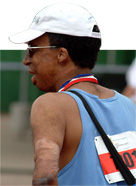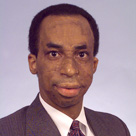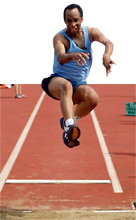

When it comes to organ donation and transplantation, Mark Walker doesn’t just talk the talk. He literally walks, runs and jumps it on behalf of South Carolinians awaiting the gift of life.
Walker — a transplant recipient — and three teammates recently won a bronze medal for their third-place finish in the 4X100 relay at the 2004 National Transplant Games in Minnesota. While this year’s Games commemorated the 50th anniversary of organ transplantation, it has been nearly eight years since Walker, 43, received a kidney from his brother, Daniel W. Walker, Jr., in surgery performed at the Medical University of South Carolina.
His is an extraordinary story a young man, stricken by a rare disease, overcoming both the disease and its related kidney failure, and returning to a healthy and productive personal and professional life.
But there’s more.
As an African American, Walker overcame even longer odds. According to the Organ Procurement and Transplantation Network, while black patients make up 27% of the waiting list for donor organs, only 12% of donors are black. African Americans wait an average of 18 months longer for a life-saving kidney transplant than their white counterparts.
Many African Americans attribute this disparity to their cultural and spiritual beliefs and fundamental distrust of physicians. Walker works to change that mindset as South Carolina Governor Mark Sanford’s appointee to the state’s Gift of Life Trust Fund.
“We’ve got to get over the trust issues,” says Walker. “What we’re talking about is an epidemic. Whether because of diet, or lack of exercise, or underlying health issues, we have many, many African Americans on dialysis or suffering from kidney failure. We can play a vital role in overcoming this by being organ donors. That’s where the leap must occur. Transplantation works, but there aren’t enough organs available. Our challenge is to get people to view organ donation as the opportunity to save a life.”
Walker challenges healthcare professionals to overcome patients’ distrust and take the time to discuss organ donation.
“Doctors need to play a better and stronger role in changing the mindset,” says Walker. “In working to save lives and improve their patients’ health, physicians must explain to their patients that a window exists to help others. I understand the fears and misunderstanding, but we’ve all got to get on the bandwagon. I know that doctors often don’t have the time to explain organ donation to every patient. But we must do better. It has to be a mission.”
 Walker’s health odyssey began in 1995, when he was diagnosed with Wegener’s Granulomatosis, an uncommon disease that is even more rare among African Americans. Symptoms include inflamed blood vessels, limiting the flow of blood to vital organs, including the kidneys. In Walker’s case, physicians controlled the disease through chemotherapy, but the damage to his kidneys was done. He began dialysis and the long wait for word that he was both free from disease and a match for a donor organ.
Walker’s health odyssey began in 1995, when he was diagnosed with Wegener’s Granulomatosis, an uncommon disease that is even more rare among African Americans. Symptoms include inflamed blood vessels, limiting the flow of blood to vital organs, including the kidneys. In Walker’s case, physicians controlled the disease through chemotherapy, but the damage to his kidneys was done. He began dialysis and the long wait for word that he was both free from disease and a match for a donor organ.
“Once you’re approved as a transplant candidate, the process of looking for a donor organ begins,” Walker says. “It can be a long process, especially for African Americans, who are not traditionally donors. Originally, we were thinking in terms of a cadaver (deceased) donor. But then, I reached a point where peritoneal dialysis just wasn’t enough to cleanse my body. I began hemodialysis, and at that point, my brother decided that he wanted to be a living donor.
“Originally, I was against it. It’s very difficult to ask a family member to make that kind of commitment and face that kind of risk. But he approached me and said it was something he wanted to do. That’s not uncommon. But still, it was a bridge I didn’t want to cross.”
With encouragement and support from their family, the Walker brothers exchanged the gift of life in December of 1997. Almost eight years later, Walker, his wife Pamela and their daughter Dakota live in Columbia. Walker is a District Team Manager for the South Carolina Department of Transportation. In his spare time, he advocates on behalf of organ donation, whether through his service on the Gift of Life Trust Fund Board, speaking engagements and appearances, or by competing in the Transplant Games.
 “One of the missions of the Games is to show that people can return to their former active lifestyles, with few limitations,” Walker says. “I can’t lift weights the way I once did, but I can run, jump and take part in many other physical activities.”
“One of the missions of the Games is to show that people can return to their former active lifestyles, with few limitations,” Walker says. “I can’t lift weights the way I once did, but I can run, jump and take part in many other physical activities.”
Of the bronze medal that he and teammates Nate Miller, Trent Satterwhite and Kristen McCall won, Walker says: “When I was sitting in dialysis chairs, I never envisioned this would be where I’d end up. I had to come to peace with everything that happened, then move on. When I look back at the madness of it all, I guess I went through it to become an advocate for organ donation and transplantation.”
(Transplant games photos courtesy of Bob Garypie and TransWeb.org. Visit the TransWeb site for information on organ donation and transplantation.)
To learn more:
See our Transplantation and Organ Donation sections in; Find Out About > Disease and Health Problems.- Granulomatosis with Polyangiitis (Wegener's)
(MedlinePlus)
- Links to sites about Wegenerâs Granulomatosis which have been reviewed by librarians at the National Library of Medicine.
- https://medlineplus.gov/granulomatosiswithpolyangiitis.html
Written by: Richard C. Jablonski, B.S.
Last Modified: Tuesday February 14, 2017 11:13 AM

